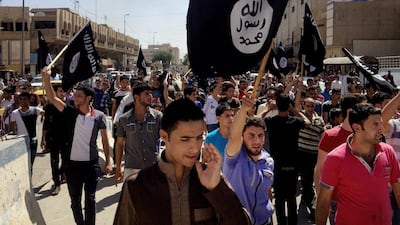The numbers seem compelling. The Pentagon said this week that ISIL has lost 700 square kilometres of its territory since it seized parts of Syria and Iraq in early June.
According to Iraqi analyst Hisham Al Hashimi, ISIL has lost 10 per cent of its territory, 90 per cent of its sources of income, nine out of 11 of its weapons warehouses in Iraq and three out of 10 warehouses in Syria. More than 30 leaders of the organisation have also been killed, including high-ranking commanders and officials such as Abu Muslim Al Turkmani, Abu Bakr Al Baghdadi’s deputy, and Ridwan Taleb Al Hamdouni, the group’s leader in Mosul.
The numbers seem to indicate ISIL is being hit where it hurts. It has lost most of the resources that had made it the richest terror group on the planet, as well as several of its top leaders. Territorially, the group has lost the momentum to advance towards Baghdad, the Kurdish region and northern Syria. In terms of governance, ISIL has also lost the ability to lavishly spend on its “state-building” project that once seemingly made it a viable alternative to governments and established militias.
But these numbers do not indicate that ISIL is retreating. First, according to Al Hashimi, ISIL has compensated for its territorial losses in Iraq by gaining around four per cent more territory inside Syria. More than that, the group’s losses over the past six months should be seen in the wider context of ISIL’s military presence to avoid misplaced proclamations. The terror group still tightly controls large provinces and cities and towns in Syria and Iraq, while it is still diverting the resources of its enemies to battles outside its territories.
Despite the airstrikes, ISIL still took over towns and villages, such as Hit in Iraq and hamlets in Anbar and Aleppo. It still made advances despite being under aerial bombardment.
It is important to distinguish between ISIL’s territory and other military front lines where ISIL was on the offensive against Iraqi government troops and militias. While ISIL has been contained in areas where it previously benefited from the disorganisation of its foes, it still reigns supreme in most of the areas it has controlled since June.
A closer look at the reality on the ground reveals that ISIL is still receiving a large number of volunteers from the communities under its control, its model of governance is still working despite the targeting of its resources and there are no signs of threats to its rule. Doomsday scenarios suggesting the group is failing to appease the population living in its territory are not realistic.
In terms of governance, one should recognise that ISIL’s model is different from that of other groups: it is a manager more than a provider.
ISIL manages the resources it has regardless of whether they are sufficient to make the lives of people better. Before ISIL took control of areas in Syria, for example, Al Qaeda affiliate Jabhat Al Nusra, the FSA and factions within the Islamic Front provided services to the local communities. A powerful family near an oil well would just take it over and pocket the money. Armed groups would be unable or reluctant to force the family to contribute to social services. When ISIL emerged, oil resources would be distributed not only in the vicinity but to all communities under its command. ISIL would also compel former government employees to go to work.
Today, this system means ISIL can efficiently manage and distribute other resources among the local population. And people’s anger is diverted to those who are targeting these resources. In this sense, ISIL becomes a tyranny under sanctions, and there are enough examples of tyrannies in the region surviving tough sanctions.
As recent media reports suggest, the worst thing to do when dealing with ISIL seems to have already happened: distraction from the real issues that led to the rise of ISIL in favour of wishful thinking or cynical overstatements of achievement.
The problem is more ominous for the international forces that are participating in the anti-ISIL campaign.
For local forces, such as the Kurdish government and the Shia militias in Iraq, even the limited retreat of ISIL will be a relief and will also mean that they have made extra gains in the process. But for outsiders, the problem of ISIL persists. The appetite for local resistance is nowhere to be felt.
Before the air strikes, reports of local forces fighting or willing to fight ISIL were common, in northern and eastern Syria, as well as Iraq. Today, the political crises in these two countries make fighting ISIL low priority and high cost.
Despite what numbers say, ISIL is still in full control of its territory and sometimes on the offensive in enemy territory.
Hassan Hassan is an analyst at the Delma Institute
Follow on Twitter: hxhassan

